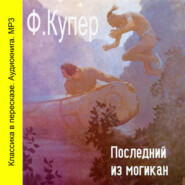По всем вопросам обращайтесь на: info@litportal.ru
(©) 2003-2024.
✖
Mercedes of Castile: or, The Voyage to Cathay
Настройки чтения
Размер шрифта
Высота строк
Поля
"The ways of God are often mysterious to his creatures," said the friar; "but we are taught that they all lead to the exaltation of his name and to the glory of his attributes."
"It is so that I consider it, father; and with such views have I always regarded my own humble efforts to honor him. We are but instruments, and useless instruments, too, when we look at how little proceedeth from our own spirits and power."
"There cometh the blessed symbol that is our salvation and guide!" exclaimed the friar, holding out both arms eagerly, as if to embrace some distant object in the heavens, immediately falling to his knees, and bowing his shaven and naked head, in deep humility, to the earth.
Columbus turned his eyes in the direction indicated by his companion's gestures, and he beheld the large silver cross that the sovereigns had carried with them throughout the late war, as a pledge of its objects, glittering on the principal tower of the Alhambra. At the next instant, the banners of Castile and of St. James were unfolded from other elevated places. Then came the song of triumph, mingled with the chants of the church. Te Deum was sung, and the choirs of the royal chapel chanted in the open fields the praises of the Lord of Hosts. A scene of magnificent religious pomp, mingled with martial array, followed, that belongs rather to general history than to the particular and private incidents of our tale.
CHAPTER V
"Who hath not proved how feebly words essay
To fix one spark of beauty's heavenly ray?
Who doth not feel, until his failing sight
Faints into dimness with its own delight,
His changing cheek, his sinking heart confess
The might – the majesty of loveliness!"
Byron.
That night the court of Castile and Aragon slept in the palace of the Alhambra. As soon as the religious ceremony alluded to in the last chapter had terminated, the crowd rushed into the place, and the princes followed, with a dignity and state better suited to their high character. The young Christian nobles, accompanied by their wives and sisters – for the presence of Isabella, and the delay that attended the surrender, had drawn together a vast many of the gentler sex, in addition to those whose duty it was to accompany their royal mistress – hurried eagerly through the celebrated courts and fretted apartments of this remarkable residence; nor was curiosity appeased even when night came to place a temporary stay to its indulgence. The Court of the Lions in particular, a place still renowned throughout Christendom for its remains of oriental beauty, had been left by Boabdil in the best condition; and, although it was midwinter, by the aid of human art it was even then gay with flowers; while the adjacent halls, those of the Two Sisters and of Abencerrages, were brilliant with light, and alive with warriors and courtiers, dignified priests and luxuriant beauty.
Although no Spanish eye could be otherwise than familiar with the light peculiar graces of Moorish architecture, these of the Alhambra so much surpassed those of any other palace which had been erected by the Mussulman dynasties of that part of the world, that their glories struck the beholders with the freshness of novelty, as well as with the magnificence of royalty. The rich conceits in stucco, an art of eastern origin then little understood in Christendom; the graceful and fanciful arabesques – which, improved on by the fancies of some of the greatest geniuses the world ever saw, have descended to our own times, and got to be so familiar in Europe, though little known on this side of the Atlantic – decorated the walls, while brilliant fountains cast their waters into the air, and fell in glittering spray, resembling diamonds.
Among the throng that moved through this scene of almost magical beauty, was Beatriz de Bobadilla, who had long been the wife of Don Andres de Cabrera, and was now generally known as the Marchioness of Moya; the constant, near, and confidential friend of the queen, a character she retained until her royal mistress was numbered with the dead. On her arm leaned lightly a youthful female, of an appearance so remarkable, that few strangers would have passed her without turning to take a second look at features and a countenance that were seldom seen and forgotten. This was Doña Mercedes de Valverde, one of the noblest and richest heiresses of Castile; the relative, ward, and adopted daughter of the queen's friend – favorite being hardly the term one would apply to the relation in which Doña Beatriz stood toward Isabella. It was not the particular beauty of Doña Mercedes, however, that rendered her appearance so remarkable and attractive; for, though feminine, graceful, of exquisite form, and even of pleasing features, there were many in that brilliant court who would generally be deemed fairer. But no other maiden of Castile had a countenance so illuminated by the soul within, or no other female face habitually wore so deep an impression of sentiment and sensibility; and the professed physiognomist would have delighted to trace the evidences of a deeply-seated, earnest, but unobtrusive enthusiasm, which even cast a shade of melancholy over a face that fortune and the heart had equally intended should be sunny and serene. Serene it was, notwithstanding; the shadow that rested on it seeming to soften and render interesting its expression, rather than to disturb its tranquillity or to cloud its loveliness.
On the other side of the noble matron walked Luis de Bobadilla, keeping a little in advance of his aunt, in a way to permit his own dark, flashing looks to meet, whenever feeling and modesty would allow it, the fine, expressive blue eyes of Mercedes. The three conversed freely, for the royal personages had retired to their private apartments, and each group of passengers was so much entranced with the novelty of its situation and its own conversation, as to disregard the remarks of others.
"This is a marvel, Luis," observed Doña Beatriz, in continuation of a subject that evidently much interested them all, "that thou, a truant and a rover thyself, should now have heard for the first time of this Colon! It is many years since he has been soliciting their Highnesses for their royal aid in effecting his purposes. The matter of his schemes was solemnly debated before a council at Salamanca; and he hath not been without believers at the Court itself."
"Among whom is to be classed Doña Beatriz de Cabrera," said Mercedes, with that melancholy smile that had the effect to bring out glimpses of all the deep but latent feeling that lay concealed beneath the surface: "I have often heard Her Highness declare that Colon hath no truer friend in Castile."
"Her Highness is seldom mistaken, child – and never in my heart. I do uphold the man; for to me he seemeth one fitted for some great and honorable undertaking; and surely none greater hath ever been proposed or imagined by human mind, than this he urgeth. Think of our becoming acquainted with the nations of the other side of the earth, and of finding easy and direct means of communicating with them, and of imparting to them the consolations of Holy Church!"
"Ay, Señora my aunt," cried Luis, laughing, "and of walking in their delightful company with all our heels in the air, and our heads downward! I hope this Colon hath not neglected to practice a little in the art, for it will need some time to gain a sure foot, in such circumstances. He might commence on the sides of these mountains, by way of a horn-book, throwing the head boldly off at a right-angle; after which, the walls and towers of this Alhambra would make a very pretty grammar, or stepping-stone to new progress."
Mercedes had unconsciously but fervently pressed the arm of her guardian, as Doña Beatriz admitted her interest in the success of the great project; but at this sally of Don Luis, she looked serious, and threw a glance at him, that he himself felt to be reproachful. To win the love of his aunt's ward was the young man's most ardent wish; and a look of dissatisfaction could at any moment repress that exuberance of spirits which often led him into an appearance of levity that did injustice to the really sterling qualities of both his heart and mind. Under the influence of that look, then, he was not slow to repair the wrong he had done himself, by adding almost as soon as he had ceased to speak —
"The Doña Mercedes is of the discovering party, too, I see; this Colon appeareth to have had more success with the dames of Castile than with her nobles" —
"Is it extraordinary, Don Luis," interrupted the pensive-looking girl, "that women should have more confidence in merit, more generous impulses, more zeal for God, than men?"
"It must be even so, since you and my aunt, Doña Beatriz, side with the navigator. But I am not always to be understood in the light I express myself;" Mercedes now smiled, but this time it was archly – "I have never studied with the minstrels, nor, sooth to say, deeply with the churchmen. To be honest with you, I have been much struck with this noble idea; and if Señor Colon doth, in reality, sail in quest of Cathay and the Indies, I shall pray their Highnesses to let me be one of the party, for, now that the Moor is subdued, there remaineth little for a noble to do in Spain."
"If thou should'st really go on this expedition," said Doña Beatriz, with grave irony, "there will, at least, be one human being topsy-turvy, in the event of thy reaching Cathay. But yonder is an attendant of the court; I doubt if Her Highness doth not desire my presence."
The Lady of Moya was right – the messenger coming to announce to her that the queen required her attendance. The manners of the day and country rendered it unseemly that Doña Mercedes should continue her promenade accompanied only by Don Luis, and the marchioness led the way to her own apartments, where a saloon suitable to her rank and to her favor with the queen, had been selected for her from among the numberless gorgeous rooms of the Moorish kings. Even here, the marchioness paused a moment, in thought, before she would leave her errant nephew alone with her ward.
"Though a rover, he is no troubadour, and cannot charm thy ear with false rhymes. It were better, perhaps, that I sent him beneath thy balcony, with his guitar; but knowing so well his dulness, I will confide in it, and leave him with thee, for the few minutes that I shall be absent. A cavalier who hath so strong a dislike to reversing the order of nature, will not surely condescend to go on his knees, even though it be to win a smile from the sweetest maiden in all Castile."
Don Luis laughed; Doña Beatriz smiled, as she kissed her ward, and left the room; while Doña Mercedes blushed, and riveted her gaze on the floor. Luis de Bobadilla was the declared suitor and sworn knight of Mercedes de Valverde; but, though so much favored by birth, fortune, affinity, and figure, there existed some serious impediments to his success. In all that was connected with the considerations that usually decide such things, the union was desirable; but there existed, nevertheless, a strong influence to overcome, in the scruples of Doña Beatriz, herself. High-principled, accustomed to the just-minded views of her royal mistress, and too proud to do an unworthy act, the very advantages that a marriage with her ward offered to her nephew, had caused the marchioness to hesitate. Don Luis had little of the Castilian gravity of character – and, by many, his animal spirits were mistaken for lightness of disposition and levity of thought. His mother was a woman of a very illustrious French family; and national pride had induced most observers to fancy that the son inherited a constitutional disposition to frivolity, that was to be traced to the besetting weakness of a whole people. A consciousness of his being so viewed at home, had, indeed, driven the youth abroad; and as, like all observant travellers, he was made doubly sensible of the defects of his own state of society on his return, a species of estrangement had grown up between him and his natural associates that had urged the young man, again and again, to wander into foreign lands. Nothing, indeed, but his early and constantly increasing passion for Mercedes had induced him to return; a step that, fortunately for himself, he had last taken in time to assist in the reduction of Granada. Notwithstanding these traits, which, in a country like Castile, might be properly enough termed peculiarities, Don Luis de Bobadilla was a knight worthy of his lineage and name. His prowess in the field and in the tourney, indeed, was so very marked as to give him a high military character, in despite of what were deemed his failings; and he passed rather as an inconsiderate and unsafe young man, than as one who was either debased or wicked. Martial qualities, in that age in particular, redeemed a thousand faults; and Don Luis had even been known to unhorse, in the tourney, Alonzo de Ojeda, then the most expert lance in Spain. Such a man could not be despised, though he might be distrusted. But the feeling which governed his aunt, referred quite as much to her own character as to his. Deeply conscientious, while she understood her nephew's real qualities much better than mere superficial observers, she had her doubts about the propriety of giving the rich heiress who was entrusted to her care, to so near a relative, when all could not applaud the act. She feared, too, that her own partiality might deceive her, and that Luis might in truth be the light and frivolous being he sometimes appeared to be in Castilian eyes, and that the happiness of her ward would prove the sacrifice of the indiscretion. With these doubts, then, while she secretly desired the union, she had in public looked coldly on her nephew's suit; and, though unable, without a harshness that circumstances would not warrant, to prevent all intercourse, she had not only taken frequent occasions to let Mercedes understand her distrust, but she had observed the precaution not to leave so handsome a suitor, notwithstanding he was often domiciliated in her own house, much alone with her ward.
The state of Mercedes' feelings was known only to herself. She was beautiful, of an honorable family, and an heiress; and as human infirmities were as besetting beneath the stately mien of the fifteenth century as they are to-day, she had often heard the supposed faults of Don Luis' character sneered at, by those who felt distrustful of his good looks and his opportunities. Few young females would have had the courage to betray any marked preference under such circumstances, until prepared to avow their choice, and to take sides with its subject against the world; and the quiet but deep enthusiasm that prevailed in the moral system of the fair young Castilian, was tempered by a prudence that prevented her from running into most of its lighter excesses. The forms and observances that usually surround young women of rank, came in aid of this native prudence; and even Don Luis himself, though he had watched the countenance and emotions of her to whom he had so long urged his suit, with a lover's jealousy and a lover's instincts, was greatly in doubt whether he had succeeded in the least in touching her heart. By one of those unlooked-for concurrences of circumstances that so often decide the fortunes of men, whether as lovers or in more worldly-minded pursuits, these doubts were now about to be unexpectedly and suddenly removed.
The triumph of the Christian arms, the novelty of her situation, and the excitement of the whole scene, had aroused the feelings of Mercedes from that coy concealment in which they usually lay smothered beneath the covering of maiden diffidence; and throughout the evening her smile had been more open, her eye brighter, and her cheeks more deeply flushed, than was usual even with one whose smiles were always sweet, whose eyes were never dull, and whose cheeks answered so sensitively to the varying impulses within.
As his aunt quitted the room, leaving him alone with Mercedes for the first time since his return from his last ramble, Don Luis eagerly threw himself on a stool that stood near the feet of his adored, who placed herself on a sumptuous couch, that, twenty-four hours before, had held the person of a princess of Abdallah's family.
"Much as I honor and reverence Her Highness," the young man hurriedly commenced, "my respect and veneration are now increased ten-fold! Would that she might send for my beloved aunt thrice where she now wants her services only once! and may her presence become so necessary to her sovereign that the affairs of Castile cannot go on without her counsel, if so blessed an opportunity as this, to tell you all I feel, Doña Mercedes, is to follow her obedience!"
"It is not they who are most fluent of speech, or the most vehement, who always feel the deepest, Don Luis de Bobadilla."
"Nor do they feel the least. Mercedes, thou canst not doubt my love! It hath grown with my growth – increased with each increase of my ideas – until it hath got to be so interwoven with my mind itself, that I can scarce use a faculty that thy dear image doth not mingle with it. In all that is beautiful, I behold thee; if I listen to the song of a bird, it is thy carol to the lute; or if I feel the gentle south wind from the fragrant isles fanning my cheek, I would fain think it thy sigh."
"You have dwelt so much among the light conceits of the French court, Don Luis, you appear to have forgotten that the heart of a Castilian girl is too true, and too sincere, to meet such rhapsodies with favor."
Had Don Luis been older, or more experienced in the sex, he would have been flattered by this rebuke – for he would have detected in the speaker's manner, both feeling of a gentler nature than her words expressed, and a tender regret.
"If thou ascribest to me rhapsodies, thou dost me great injustice. I may not do credit to my own thoughts and feelings; but never hath my tongue uttered aught to thee, Mercedes, that the heart hath not honestly urged. Have I not loved thee since thou and I were children? Did I ever fail to show my preference for thee when we were boy and girl, in all the sports and light-hearted enjoyments of that guileless period?"
"Guileless, truly," answered Mercedes, her look brightening as it might be with agreeable fancies and a flood of pleasant recollections – doing more, in a single instant, to break down the barriers of her reserve, than years of schooling had effected toward building them up. "Thou wert then, at least, sincere, Luis, and I placed full faith in thy friendship, and in thy desire to please."
"Bless thee, bless thee, for these precious words, Mercedes! for the first time in two years, hast thou spoken to me as thou wert wont to do, and called me Luis without that courtly, accursed, Don."
"A noble Castilian should never regard his honors lightly, and he oweth it to his rank to see that others respect them, too;" answered our heroine, looking down, as if she already half repented of the familiarity. "You are quick to remind me of my forgetfulness, Don Luis de Bobadilla."
"This unlucky tongue of mine can never follow the path that its owner wisheth! Hast thou not seen in all my looks – all my acts – all my motives – a desire to please thee, and thee alone, lovely Mercedes? When Her Highness gave her royal approbation of my success, in the last tourney, did I not seek thine eye, in order to ask if thou notedst it? Hast thou ever expressed a wish, that I have not proved an eager desire to see it accomplished?"
"Nay, now, Luis, thou emboldenest me to remind thee that I expressed a wish that thou wouldst not go on thy last voyage to the north, and yet thou didst depart! I felt that it would displease Doña Beatriz; thy truant disposition having made her uneasy lest thou shouldst get altogether into the habits of a rover, and into disfavor with the queen."
"It was for this that thou madst the request, and it wounded my pride to think that Mercedes de Valverde should so little understand my character, as to believe it possible a noble of my name and lineage could so far forget his duties as to sink into the mere associate of pilots and adventurers."
"Thou didst not know that I believed this of thee."
"Hadst thou asked of me, Mercedes, to remain for thy sake – nay, hadst thou imposed the heaviest services on me, as thy knight, or as one who enjoyed the smallest degree of thy favor – I would have parted with life sooner than I would have parted from Castile. But not even a look of kindness could I obtain, in reward for all the pain I had felt on thy account" —
"Pain, Luis!"
"Is it not pain to love to the degree that one might kiss the earth that received the foot-print of its object – and yet to meet with no encouragement from fair words, no friendly glance of the eye, nor any sign or symbol to betoken that the being one hath enshrined in his heart's core, ever thinketh of her suitor except as a reckless rover and a hair-brained adventurer?"
"Luis de Bobadilla, no one that really knoweth thy character, can ever truly think thus of thee."
"A million of thanks for these few words, beloved girl, and ten millions for the gentle smile that hath accompanied them! Thou mightst mould me to all thy wishes" —
"My wishes, Don Luis?"
"To all thy severe opinions of sobriety and dignity of conduct, wouldst thou but feel sufficient interest in me to let me know that my acts can give thee either pain or pleasure."
"Can it be otherwise? Could'st thou, Luis, see with indifference the proceedings of one thou hast known from childhood, and esteemed as a friend?"
"Esteem! Blessed Mercedes! dost thou own even that little in my favor?"

















